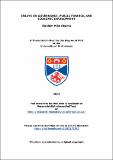Essays on governance, public finance, and economic development
Abstract
This thesis is composed of three distinct but related essays. The first essay
studies the role of the size of the economy in mitigating the impact of
public sector corruption on economic development. The analysis is based on
a dynamic general equilibrium model in which growth occurs endogenously
through the invention and manufacture of new intermediate goods that are
used in the production of output. Potential innovators decide to enter the
market considering the fraction of future profits that may be lost to corruption.
We find that depending on the number of times bribes are demanded,
the size of the economy may be an important factor in determining the effects
of corruption on innovation and economic growth.
The second essay presents an occupational choice model in which a household
can choose either formal or informal entrepreneurship or at the subsistence
livelihood. Credit market constraints and initial wealth conditions
(bequest) determine an agent’s occupational choice. Corruption arises when
bureaucrats exchange investment permits for bribes. Corruption worsens
credit market constraints. Equilibrium with corruption is characterised by
an increase (decrease) in informal (formal) entrepreneurship and a decrease in
formal entrepreneurship wealth. Since corruption-induced credit constrained
households choose informal entrepreneurship as opposed to subsistence livelihood
income in the formal sector, the informal economy is shown to mitigate
the extent of income inequality.
The third essay explains the role of bureaucratic corruption in undermining
public service delivery, public finance, and economic development
through incentivising tax evasion. The analysis is based on a dynamic general
equilibrium model in which a taxable household observes the quality of
public services and decides whether or not to fulfil his tax obligation. Bureaucratic
corruption compromises the quality of public services such that a
taxable household develops incentives to evade tax payment. We show that
corruption-induced tax evasion increases the likelihood of a budget deficit,
renders tax payable increase counter-productive, and aggravates the negative
effect of bureaucratic corruption on economic development.
Type
Thesis, PhD Doctor of Philosophy
Collections
Items in the St Andrews Research Repository are protected by copyright, with all rights reserved, unless otherwise indicated.

